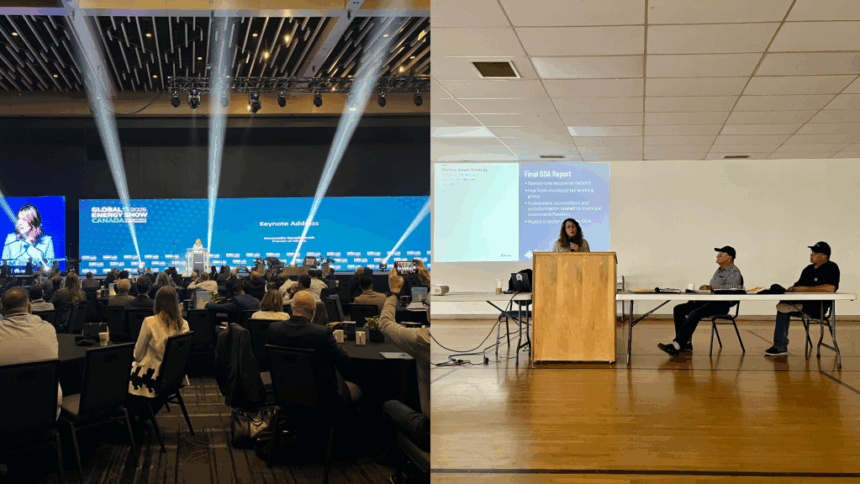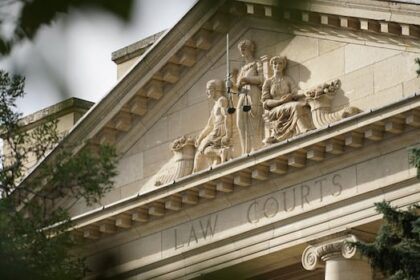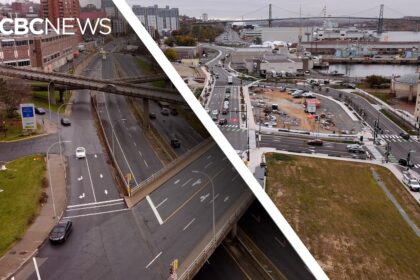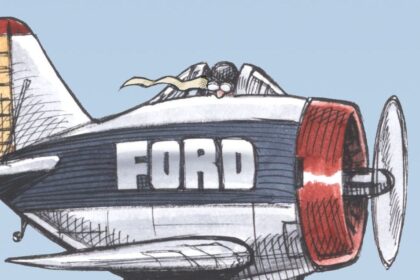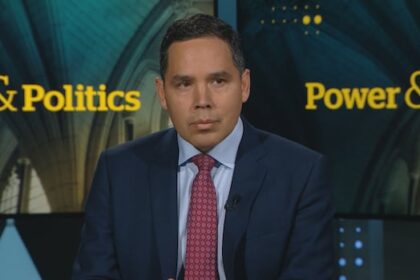In early June, the smoke outside the Warburg Community Hall, one hour west of Edmonton, hangs thick, a blanket that stretches the length of the white-knuckle highway between Edmonton and Calgary. Inside the hall, where a shuffleboard floor leads to a small stage, there are doughnuts in plastic containers and Maxwell House instant coffee on offer past rows of plastic folding tables and chairs. Help yourself. A crowd trickles in — approximately 30 by the time things get underway — made up of landowners and rural councillors gathered to hear Kara Westerlund, the president of the Rural Municipalities of Alberta, a coalition of 69 counties and municipal districts. She’s speaking at this meeting of the Warburg Pembina Surface Rights Group about companies not paying their taxes owed to local governments and about the province’s new plan to deal with old wells. The organizer, Karl Zajes, is a tireless man sporting a black cap emblazoned with a maple leaf and the word “Canada” — itself a political statement at this time and place in Alberta. Frustration, unlike the coffee, percolates. The small crowd talks of the double standards they see between how they’re treated compared to oil and gas companies — the lack of regulations or enforcement, the ability of companies to withhold taxes or lease payments, to let weeds bloom or to leave wells leaking and rusting for years on end. “I want to be clear, $100 million [in taxes] right now is outstanding by companies that continue to operate on our landscape,” Westerlund tells the gathering, referencing her organization’s latest report. “They’re just simply choosing not to pay us because there’s no recourse.” The morning after the meeting in Warburg, the smoke keeps closing in, thickening. Children are kept inside, the haze giving a weight to the world, a strange hardness despite the gauzy air obscuring the fields. The Global Energy Show in Calgary featured everything from high-profile speakers to expensive gear for the oil industry, including this all-terrain vehicle. Jeff McIntosh / The Canadian Press The ambience is starkly different in Calgary that day, within the cavernous ballroom of the new BMO Centre. There, Alberta Premier Danielle Smith stands on a stage flanked by giant screens projecting her image, speaking to the well-heeled international crowd at the Global Energy Show — an annual conference of hundreds of industry leaders, from the head of Organization of the Petroleum Exporting Countries to engineers pitching new devices to help extract oil. High-powered beams of light shine from the stage to the ceiling dozens of meters overhead and a bank of news cameras fill a riser at the back of the room. There are no doughnuts. A lounge on the second floor is restricted to VIPs. “Obviously, Alberta benefits tremendously from developing its energy to the fullest, but the rewards aren’t limited to our province or a handful of companies, far from it,” Smith says. “Everybody wins when Alberta realizes the full potential of its energy.” Smith speaks of global power and conflict and emissions, on national priorities and a willingness of her government to incentivize building pipelines. She doesn’t talk about residents in places like Warburg, who don’t feel like everyone is winning. It’s hard not to see the lines that have been drawn across Alberta. The policies and priorities that fuelled a compact between energy and landowners are disintegrating. The cities are rising, with their glimmering towers built by oil, while rural communities deal with the consequences. Companies maximize revenue and limit costs — even if that means ignoring well cleanup, dodging taxes or lease payments. It’s a line that often appears to have the government on one side, and residents on the other. In Warburg, Westerlund pointed out that there were no provincial politicians in the room, though the town is just an hour from the provincial capital. “What I want to point out is we’re all friends in this room,” Westerlund tells those gathered in Warburg. “We’re all here for the same reasons and for the right reasons. Where’s your MLA?” Alberta, always an energy booster, has increased its support Oil and gas drives the politics of this place. The budget sinks or swims on the price of a barrel, premiers outdo each other in showing just how much they heart oil and gas. In 2024-25, the government posted a budget surplus of $5.8 billion, driven by larger than anticipated resources revenues. That plunged this year, to a forecasted $5.2 billion deficit. It’s the kind of roller coaster long-time Albertans are used to. Boom and bust, swaying to global market forces. But there is a tangible shift towards even more support of the energy sector, after years of serious talk about emissions reductions and a transition away from fossil fuels. The United Conservative Party under Danielle Smith took a sledgehammer to the province’s surging renewable energy sector, while aggressively pushing back against net-zero targets and throwing its full political and economic weight behind the oil and gas sector. The government is deliberating a report into how to tackle the immense issue of inactive and orphan wells that sit polluting the land, using public dollars instead of ensuring companies pay to clean up their own mess. Where there is will, there is a way and there is plenty of money. But the forces at play aren’t just economic or environmental, they’re tearing at the very social fabric of confederation. Alberta Premier Danielle Smith says the future of Alberta’s place in confederation is in question if the federal government doesn’t move aggressively to allow vast expansions of oil and gas infrastructure. Photo: Amber Bracken / The Narwhal Smith, while claiming not to be a separatist, has set the future of Canada on the table unless the federal government adheres to a list of demands, all tied to vastly increasing support for the oil and gas sector. Onstage at the Global Energy Show, Smith is interviewed by former CBC News anchor Peter Mansbridge, who asks whether she thinks the future of confederation depends on Ottawa ensuring development of oil and gas infrastructure. In short, she does, and she’s giving Prime Minister Mark Carney, who is pushing controversial legislation that would bypass regulations to get projects built faster, a few months to meet her demands. “I think a lot of it is related to how Ottawa treats us, particularly around energy,” she says. “It’s not ideological. And it’s not symbolic. It matters to people.” Smith says federal support for the Pathways Alliance plan to capture and store millions of tonnes of carbon from the oilsands — a massive project running through rural communities that will require billions in public funds to become reality — is critical. That, despite the residents along its path who worry about the potential risks of contaminated groundwater, explosion and more. “It is this kind of nation-building project that will deliver thousands of new jobs, billions in royalties and taxes that support our vital social fabric while delivering responsible and lower emissions to the world,” Smith says. The struggle to make companies pay and make Alberta listen In Warburg, the crowd wonders where those taxes that support the vital social fabric are. The Rural Municipalities of Alberta says as of Dec. 31, 2024, $254 million in property taxes from oil and gas companies was outstanding, while another $200 million has been written off, never to be collected. Westerlund says $100 million of the outstanding taxes are owed by approximately 200 companies that are still operating. Then there’s the issue of inactive and orphaned wells — old wells that have not been reclaimed or wells without solvent owners — and an estimated $36 billion in liabilities littered across the province with almost no security in place to clean it all up. That figure is likely a conservative estimate, and it doesn’t include the oilsands, which balloons the total well above $100 billion. In Warburg, the crowd expressed frustration with the perceived double standard in how residents are treated compared to oil and gas companies. Photo: Supplied by Phillip Meintzer / Coalition for Responsible Energy Several in the crowd ask why the government or the Alberta Energy Regulator doesn’t just force companies to pay what they owe. It’s a frustration Westerlund shares, especially since, she says, the province will step in and seize assets if the government doesn’t get its royalty payments, forecast to be $21.5 billion in 2024-25. “Funny, they have the power if [companies] stop paying their royalties to go in and go for the money, but property taxes we can’t touch,” she says. Westerlund says pushing struggling companies into bankruptcy is a risk, but so is putting fiscal pressure on municipalities and taxpayers to “subsidize non-bankrupt companies.” “Unfortunately, on this issue, the government has chosen to put industry’s interest above public interest and above the residents of this province,” she says. Westerlund is not impressed with the recently released Mature Asset Strategy report, the government’s latest attempt to tackle the ongoing problem of well cleanup. She says the process of writing it was “not credible” from the beginning. “There was very little non-industry and non-governmental representation, this resulted in an echo chamber in which success was defined narrowly and through industry lens only,” she says. The head of the Rural Municipalities Association says there was little understanding of what towns and other small municipalities need, including how much they rely on property taxes to operate. There was also, to her mind, an almost complete lack of data to back up the argument that lease payments and taxes are too heavy of a burden for companies. There wasn’t even a proper definition of what a mature asset actually is. The report calls for government entities to take over operations of aging oil and gas wells as a means to fund cleanup, shifting the risk to the government and using public dollars to tackle a problem private companies are legally required to solve. Tens of thousands of oil and gas wells are either inactive — languishing on the landscape and often emitting pollution — or orphaned, with no solvent owner to properly seal them and clean them up. The cost of cleanup in Alberta, including the oilsands, exceeds $100 billion, with little to no security to pay for it. Photo: Amber Bracken / The Narwhal Westerlund is glad more radical ideas did not end up in the final report, including tying taxes and leases to the price of a barrel of oil, so that companies pay less when their revenue is down. But she believes industry and its allies in government will continue to push for them. Alberta’s government has eagerly embraced the oil industry. The impacts are growing Westerlund says the province doesn’t really seem to care what her organization thinks. It’s political calculus. The association represents 85 per cent of the land mass of Alberta, she says, but only 15 per cent of the population. Alberta has changed and the priorities of the government have changed with it. So too has the national debate around building Canada into an energy powerhouse. The trade war with the U.S. and international tensions are being used by the federal government as an argument to bypass environmental, social and Indigenous concerns to build more, faster. It’s something Smith, a perennial critic of Ottawa, has eagerly embraced. Closer to home, tailings ponds continue to swell at the great oilsands mines, emissions are up. There are more than 70,000 inactive wells, some of which have languished for decades. “Our government is not enforcing the regulations, what they’re doing is sucking every nickel that they get out of the oil that’s being produced for as long as they can and then you and everybody else is going to be paying for reclamation,” Zajes, the tireless organizer in Warburg, says. “The oil companies are making millions, laughing all the way to the bank and tell you, ‘kiss my butt.’ ” Recent Posts Two Albertas: rural town halls and Big Oil’s halls of power June 24, 2025 9 min. read A meeting in rural Alberta reveals a knot of tension in the global oil industry:… Can Toronto still enforce its green building standard? Ontario says no, but the city disagrees June 23, 2025 4 min. read The province said the newly-passed Bill 17 will take away the city’s authority to enforce… On solid ice: the plan to refreeze the Arctic June 21, 2025 14 min. read As sea ice melts, Inuit cultural traditions are at risk of disappearing too. Could a…
Two Albertas: rural town halls and Big Oils halls of power
